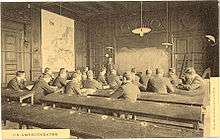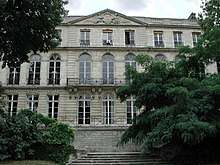Mines ParisTech
Mines ParisTech (officially École nationale supérieure des mines de Paris in French or Paris School of Mines in English, also known as École des mines de Paris, ENSMP, Mines Paris or simply les Mines), created in 1783 by King Louis XVI, is a French engineer school and a constituent college of Université PSL.
École nationale supérieure des mines de Paris | |
 | |
| Motto | Théorie et Pratique |
|---|---|
Motto in English | Theory and Practice |
| Type | Grande école |
| Established | 1783 |
| Location | , |
| Campus | Paris, Fontainebleau, Évry, Sophia Antipolis |
| Affiliations | Université PSL, Institut Mines-Télécom (Mines Télécom Institut of Technology), ParisTech (Paris Institute of Technology), Groupe des Écoles des mines, Conférence des Grandes écoles |
| Website | http://www.minesparis.psl.eu |
Mines ParisTech is distinguished for the outstanding performance of its research centers [1] and the quality of its international partnerships with other prestigious universities in the world, which include Massachusetts Institute of Technology (MIT), California Institute of Technology (Caltech), Shanghai Jiao Tong University, University of Hong Kong, National University of Singapore (NUS), Novosibirsk State University, Pontifical Catholic University of Chile and Tokyo Tech.
The École des Mines de Paris also publishes a world university ranking based on the number of alumni holding the post of CEO in one of the 500 largest companies in the world: the Mines ParisTech: Professional Ranking of World Universities. The school is a member of the ParisTech (Paris Institute of Technology) alliance.
History

Created by decree of the French King's Counsel on March 19, 1783, the first school of Mines was located in the Hôtel de la Monnaie, in Paris.
The school disappeared at the beginning of the French Revolution but was re-established by decree of the Committee of Public Safety in 1794, the 13th Messidor Year II. It moved to Savoie, after a decree of the consuls the 23rd Pluviôse Year X (1802).
After the Bourbon Restoration in 1814, the school moved to the Hôtel de Vendôme (in the 6th arrondissement near Paris' Jardin du Luxembourg). From the 1960s onwards, it created research laboratories in Fontainebleau, Évry and Sophia Antipolis (Nice).
Education

The initial aim of the Ecole des mines de Paris, namely to train high-level mining engineers, evolved with time to adapt to the technological and structural transformations undergone by society. Mines ParisTech has now become one of the most prestigious French engineering schools with a broad variety of subjects. Its students are trained to have management positions, work in research and development departments, or as operations officers, etc. They receive a well-rounded education in a variety of subjects, ranging from the most technical (Mathematics, Physics) to economics, social sciences or even art in order to be able to tackle the managing or engineering-related issues they are to face. Exchange programs are possible during the third semester with prestigious universities around the world, such as Massachusetts Institute of Technology (MIT), California Institute of Technology (Caltech), University of Hong Kong, National University of Singapore (NUS), Tokyo Tech, Seoul National University...
Degrees
Mines ParisTech provides different educational paths:
- The Ingénieurs civils degree (Master of Science and Executive Engineering), ranked among the best French Grande école engineering degrees, similar to that offered at École polytechnique, École des Ponts ParisTech or École Centrale Paris.
- The Corps of Mines, one of the greatest technical corps of the French state. It is a third cycle degree, lasting for three years, consisting in two long-term internships both in public and private economical institutions and courses in economics and public institutions.[2] The admission to the Corps des Mines is highly selective as only the top students from École polytechnique, École normale supérieure, Mines ParisTech and Telecom ParisTech may apply
- Mastère Spécialisé degrees, post-graduate programs accredited by the Conférence des Grandes écoles, in the fields of Energy, Environment, Transport and Logistics, Informatics, Safety and management in industry and Materials engineering
- Doctoral (19 schools) and Master (9 programs) studies in various fields
Admission for French and International students
For students having studied in the Classe Préparatoire aux Grandes Ecoles (a two-year highly selective undergraduate program in Mathematics, Physics and Engineering, among others), admission to Civil Engineer of Mines is decided through a nationwide competitive examination. Every year, ten applications are also accepted from students around the world according to their academic achievements.
Admission to the Corps of Mines is possible for French students at the end of the studies in École polytechnique (usually 15 of the top 20 ranked European students each year), École normale supérieure, École des télécommunications de Paris and École des mines de Paris (these two later, after a specific examination), or from the other great technical corps of the French state. Admission in third year is also open to one Ph.D graduate.
Student unions and organizations
A Student Union is elected every year after a one-week campaign, and is in charge of enhancing the contact between students and various sponsoring industries as well as organizing events for the students.
Various other organizations are part of the students' lives: the Students' Sport Committee (BDS), the Junior Enterprise (JUMP), the Arts' Office (BDA), Cahier Vert (social opening and tutoring), CAV (wine-tasting club), Catholic community, Fanfare band, Entrepreneur club (Mines Genius), humanitarian organizations (Heliotopia, CEres, Zanbinou), photography club, Sailing club, among others.
Alumni
- Maurice Allais (1911–2010), Nobel Prize in Economics, 1988
- Jean-Louis Bianco (1943–), General Secretary of President of France (1982–1991), Minister of Social Affairs (France) (1991–1992), Minister of Transport (France) (1992–1993), députy of Alpes de Haute Provence's 1st constituency (1997–)
- Louis Paul Cailletet (1832–1913), physicist and inventor
- Georges Charpak (1924–2010), Nobel Prize in Physics 1992
- Eckley Brinton Coxe (1839-1895), Owner Coxe Brothers and Company, Pennsylvania State Senator
- Jean-Baptiste Élie de Beaumont (1798–1874), founder of geology, Wollaston Medal 1843
- Thierry Desmarest, former CEO of Total
- Jean-Martin Folz, former CEO of PSA Peugeot Citroën
- Noël Forgeard, former CEO of Airbus and EADS
- Charles de Freycinet, prime minister of France at the end of the 19th century
- Tidjane Thiam (1962–), CEO of Credit Suisse
- Carlos Ghosn (1954–), CEO of Nissan, CEO of Renault-Nissan
- Auguste Laurent (1808–1853), chemist, precursor of Organic Chemistry modern
- Anne Lauvergeon, former CEO of Areva
- Albert François Lebrun (1871–1950), president of France
- Alfred-Marie Liénard (1869–1958), famous for the Liénard–Wiechert potential
- Didier Lombard (1942–), chairman and former CEO of France Télécom
- Francis Mer, former CEO of Usinor and former Minister of Finances of France
- Alain Poher (1909–1996), politician, president of Sénat, president by interim of French Republic.
- Denis Ranque, CEO of Thales Group
- Léon Walras (1834–1910), mathematical economist
- Jean-Jacques Favier (1949–), astronaut
- Jacques Aschenbroich, CEO of Valeo
- Marie-Adolphe Carnot, (1839-1920), French chemist, mining engineer and politician, having uranium ore carnotite named after him.
Research centres
Energy and Processes
- CES (Energy efficiency of Systems Center)
- CTP (Thermodynamics of Processes Center)
- OIE (Observation, Impacts, Energy Center)
- PERSEE (Processes, Renewable Energies and Energy Systems Center)
Mathematics and Systems
- CAOR (Robotics Center)
- CAS (Automatic Control and Systems Center)
- CBIO (Computational Biology Center)
- CMA (Applied Mathematics Center)
- CMM (Mathematical Morphology Center)
- CRI (Computer Science Center)
Earth Science and Environment
- Geosciences (Geosciences and Geoengineering Center)
- ISIGE (Environmental Engineering and Management Center)
Economics, Management, Society
- CERNA (Industrial Economics Center)
- CGS (Scientific Management Center)
- CRC (Crisis and Risk Research Center)
- CSI (Sociology of Innovation Center)
See also
- PSL Research University
- ParisTech
- Institut Mines-Télécom
- École des mines d'Albi-Carmaux
- École des mines d'Alès
- École des mines de Douai
- École des mines de Nantes
- École nationale supérieure des mines de Nancy
- École nationale supérieure des mines de Saint-Étienne
- École Nationale Supérieure des Mines de Rabat
- Musée de Minéralogie
- Télécom SudParis
- Mines ParisTech: Professional Ranking of World Universities
Notes and references
- Palmarès 2013 des écoles d'ingénieurs par Recherche. Usinenouvelle.com. Retrieved on 2014-06-17.
- Présentation - MINES ParisTech. Mines-paristech.fr. Retrieved on 2014-06-17.
- "Doctoral programme in French engineering school - MINES PARISTECH". www.mines-paristech.eu. Retrieved 2019-05-24.
External links
| Wikimedia Commons has media related to École nationale supérieure des mines de Paris. |